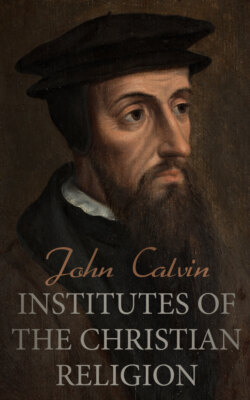Читать книгу Institutes of the Christian Religion - John Calvin - Страница 7
ОглавлениеArgument.
The first book treats of the knowledge of God the Creator; but, this being chiefly manifested in the creation of man, man also is made the subject of discussion. Thus the principal topics of the whole treatise are two—the knowledge of God, and the knowledge of man. In the first chapter, they are considered together; in the following chapters, separately; yet some things are introduced, which may be referred to either or both. What respects the Scripture and images may belong to the knowledge of God; what respects the formation of the world, the holy angels, and the devils, to the knowledge of man; and what respects the manner in which God governs the world, to both.
On the first of these topics, the knowledge of God, this book shows,
First, What kind of knowledge God himself requires—Chap. II.
Secondly, Where it must be sought—Chap. III.-IX., as follows:
1. Not in man; because, though the human mind is naturally endued with it, yet it is extinguished, partly by ignorance, partly by wickedness—Chap. III. IV.
2. Nor in the structure of the world; because, though it shines there with the brightest evidence, testimonies of that kind, however plain, are, through our stupidity, wholly useless to us—Chap. V.
3. But in the Scripture—Chap. VI.-IX.
Thirdly, What kind of a being God is—Chap. X.
Fourthly, The impiety of ascribing to God a visible form, with observations on the adoration and origin of images—Chap. XI.
Fifthly, The reasonableness that God alone should be supremely worshipped—Chap. XII.
Lastly, The unity of the Divine Essence, and the distinction of three Persons—Chap. XIII.
On the other of these topics, the knowledge of man, it contains,
First, A dissertation on the creation of the world, and on the good and evil angels, all which relate to man—Chap. XIV.
Secondly, Proceeding to man himself, an examination of his nature and powers—Chap. XV.
But, in order to a clearer illustration of the knowledge of God and man, the three remaining chapters treat of the government of all human actions and of the whole world, in opposition to fortune and fate, stating the pure doctrine, and showing its use; and conclude with proving that, though God uses the agency of the wicked, he is pure from all pollution, and chargeable with no blame.
